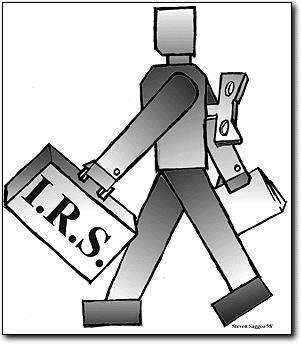![]()
![[ OPINIONS ]](/images/fall97/opinionsf97.gif)
By Rachel Alexander
Arizona Daily Wildcat April 14, 1998
The IRS: More corrupt and oppressive than ever
![[Picture]](04_3_i.gif)
Rachel Alexander |
In 1993, the IRS could not account for 64 percent of its $4.3 billion budget.
Forty-seven percent of calls to the IRS in 1987 resulted in erroneous information. In Senate investigations into the IRS last fall, it was discovered that IRS employees have targeted individuals they have disagreements with by auditing them. Political opponents of the IRS have also been audited, including one individual who simply wrote a letter to the IRS criticizing them. One former IRS agent, testifying anonymously for fear of reprisal from the IRS, stated "If the true number of incidents of taxpayer abuses were ever known, the public would be appalled. If the public also ever knew the number of abuses 'covered up' by the IRS, there could be a tax revolt." Former Commissioner Shirley Peterson, who headed the agency in 1992, notes that "We have reached the point where further patchwork will only compound the problem. It is time to repeal the Internal Revenue Code and start over."
Yet, all Al Gore and Congress have implemented is "friendlier customer service" from the IRS. Is this some kind of joke?
How did the IRS get to this stage, and why is it allowed to continue? When the IRS was created, it did not tax income. When Congress decided to tax income, it did so at a low rate, around 1 percent. This number was gradually increased by special-interest groups pressuring Congress, until it reached its present-day rates of around 30 percent. Politicians and the media did not try to stop these increases for fear of being audited. The average cost of an audit for a small business is $7000, whether there was an error or not. Filing itself is so complicated that when Money magazine asked 50 tax experts to figure out a hypothetical family's tax liability in 1989, they came up with 50 different answers. When asked again in 1990, it was observed that 48 of those answers were wrong.
Furthermore, the mistakes made by the IRS are atrocious and devastating to taxpayers. A recent General Accounting Office investigation found that almost half of IRS mail to taxpayers contained incorrect information, including half of the 30 million penalty notices that went out one year. Another probe found that two million documents, including tax returns, could not be found in the agency's files. In 1988, the IRS incorrectly assessed penalties against 1.5 million taxpayers. Recently, the IRS spent $4 billion over eleven years installing a computer system which didn't work.
A friend of mine who used to work as a collector for the IRS explained how employees went through "situational ethics" training. They were instructed to violate an ethical principle such as honesty if it produced the desirable outcome in the long run. When the IRS tried to fire him for "not producing medical records," (which is against the law) he could not find an attorney anywhere who dared to represent him against the IRS. He ended up going to his Congressman for help, who had nothing to lose since the IRS was already auditing him.

The IRS has become a tool of the White House to use against its political enemies. Under the Clinton administration, prominent conservatives and conservative groups have been audited. When the 707 FBI files on prominent Republicans were found in the White House, IRS files were found with them. The IRS has targeted conservatives, since they have been more outspoken than liberals on abolishing it, but other administrations including the Nixon administration have also been guilty of using the IRS to audit their political enemies.
Another friend of mine received a letter from the IRS last week stating that he was being penalized $227 for underpaying his taxes on his employees by 10 cents. When he called his CPA for advice, however, she told him to keep his mouth shut and pay it, because, as an active member of the Republican National Committee, he would likely be the target of an expensive audit.
Unfortunately, these abuses will continue as long as Congress is afraid to stop the IRS's unprecedented abuse of power. Members of both parties continue to tinker with the tax code each year, allowing tax breaks for some but not for others, depending on which special interest group screams the loudest or donates the most money that year.
Someone who made just under $20,000 last year, barely over the poverty line, paid around $4,759 in federal income tax, Social Security and Medicare taxes. Ever wonder why these taxes are taken out of each paycheck? Because if we were forced to pay this amount all at once, there would be a tax revolt.
Information for this article was taken from the reports to the Senate Finance Committee last fall, the General Accounting Office and a Heritage Foundation report.
Rachel Alexander is a second-year law student. Her column, "Common Sense," appears every other Tuesday.



